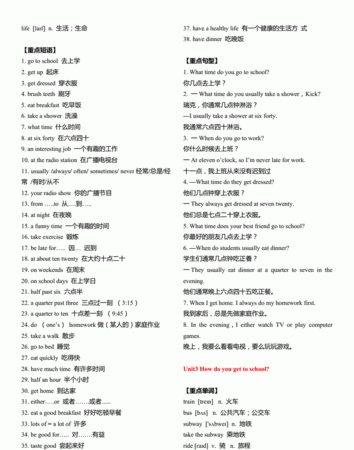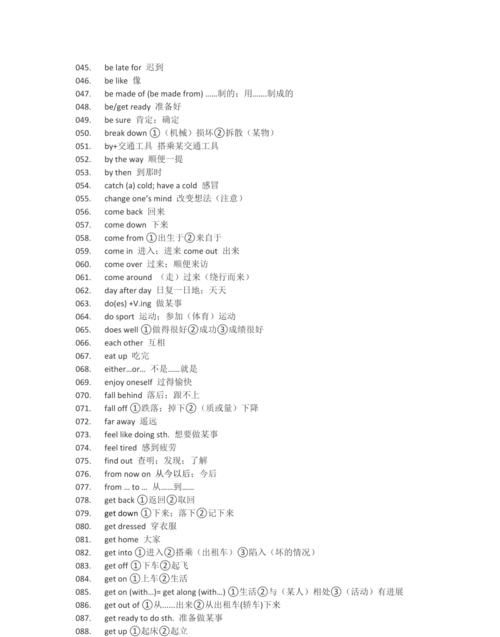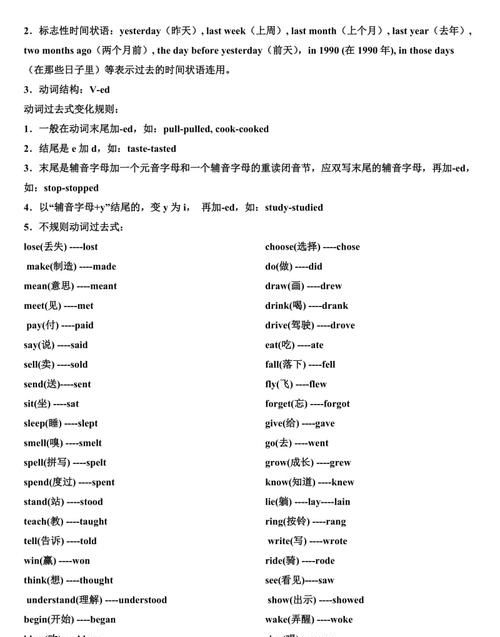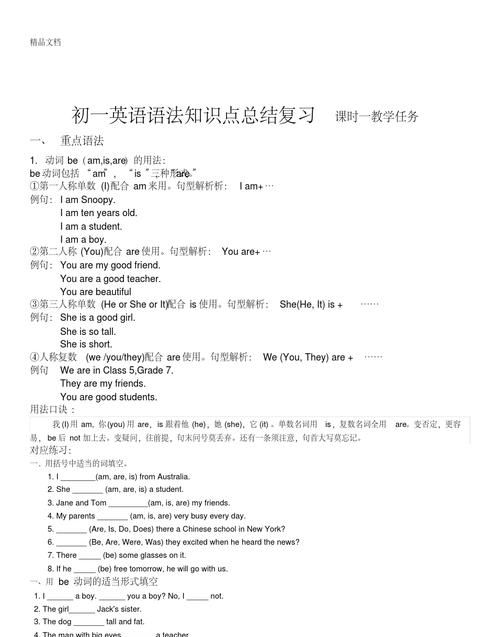本文目录
人教版初二下册英语语法知识点归纳总结
初中是学习英语的重要阶段,想要学好在初中学好英语需要对所学的知识进行归纳总结以便复习。以下是我分享给大家的初一初二英语语法知识点,希望可以帮到你!
初一初二英语语法知识点
1. The Simple Present Tense 一般现在时
一般现在时最容易出现错误的地方是在第三人称单数形式上。
everyone,everybody,no one,nobody,someone,somebody,nothing,everything,anything,以及none,each,every引导的名词或代词作主语时,谓语动词要用单数形式。
例如:
Everyone is here. 大家都在这里。
No one knows his name. 没有人知道他的名字。
2. The Present Continuous Tense 现在进行时
现在进行时最容易出现错误的地方在动词的现在分词形式上,我们在复习的时候要特别注意不规则动词的变化形式。
例如:
swimming,beginning,putting,taking,buying。
3. The Simple Future Tense 一般将来时
1) 一般将来时表示将来某个时间要发生的动作或存在的状态,也表示将来经常或反复发生的动作,常
与表示将来的时间状语连用,如:tomorrow,next week,next year等。其构成为"助动词
will +动词原形"。
2) be going to 用于一般将来时态中,表示"打算,准备,将要……"。动词be 要随着主语的人称变
化而变化,后面要用动词的原形。
例如:
He is going to walk to school.
I am going to buy a new CD.
They are going to wash the dishes after dinner.
3) go,come,leave这三个词一般不放在be going to 的后面,这三个动词如果要表示将来时,要直接
用be+ going/ coming/ leaving 的形式。
例如:
They are leaving Beijing tonight.
The teacher is coming.
We are going to the Great Wall next Saturday.
4.The Simple Past Tense一般过去时
一般过去时最明显的现象就是常由表达过去时间的副词或副词短语来修饰它。
这些常用于修饰一般过去时的副词有:yesterday,yesterday morning(afternoon,evening),just now(刚才),before(以前),then (at that time)(当时),last + 时间 (如 last week,month,year,Monday,… January,… spring,…,etc.),that + 时间 (如 that day,afternoon,summer,…,etc.),时间 + ago (如 a few minutes ago,two weeks ago,years ago,… etc.)
5.动词的常用搭配形式
let sb. do sth. 让某人做某事
It's time to do sth. 到了该做某事的时间。
want to do sth. 想做某事
Would you like to do sth?你愿意做某事吗?
help sb. (to) do sth. 帮助某人做某事
like doing sth 喜欢做某事
stop doing sth. 别做……了 stop to do sth. 停下来去做某事
finish doing sth. 结束做某事
Why not do sth. 为什么不……?
had better do sth 最好做某事
enjoy doing sth. 喜欢做某事
What about doing sth? 做……怎么样?
need to do sth. 需要做某事
Thank you for doing sth. 谢谢你……
tell sb. to do sth. 告诉某人做某事
be busy doing sth. 忙着做某事
ask sb. to do sth. 请某人做某事 / 要求某人做某事
初中英语句型归纳
1 see,hear,notice,find,feel,listen to,look at (感官动词)+ do eg: I like watching monkeys jump.
2 (比较级 and 比较级) 表示越来越……
3 a piece of cake =easy 小菜一碟(容易) 补:a place of interest 名胜
4 agree with sb. 赞成某人
5 all kinds of 各种各样 a kind of 一种/样
6 all over the world = the whole world 整个世界
7 along with 同……一道,伴随……
eg : I will go along with you 我将和你一起去
The students planted trees along with their teachers. 学生同老师们一起种树。
8 As soon as 一……就……
9 as you can see 你是知道的
10 ask for ……求助向……要……(直接接想要的东西)
eg: ask you for my book
11 ask sb. for sth. 向某人什么
12 ask sb. to do sth. 询问某人某事 ask sb. not to do sth. 叫某人不要做某事
13 at the age of 在……岁时
eg:I am sixteen. I am at the age of sixteen.
14 at the beginning of … ……的起初;……的开始
15 at the end of +地点/+时间最后;尽头;末尾
eg : At the end of the day
16 at this time of year 在每年的这个时候补:at least 至少
17 be /feel confident of sth. /that clause + 从句感觉/对什么有信心,自信
eg: I am / feel confident of my spoken English I feel that I can pass the test
18 be + doing 表:1 现在进行时 2 将来时
19 be able to (+ v.原) = can (+ v.原) 能够……
eg: She is able to sing. She can sing. 补:base on 以……(为)根据
20 be able to do sth. 能够干什么 eg: She is able to sing.
21 be afraid to do (of sth. 恐惧,害怕……
eg: I'm afraed to go out at night. I'm afraid of dog.
22 be allowed to do 被允许做什么
eg: I'm allowed to watch TV. 我被允许看电视。I should be allowed to watch TV. 我应该被允许看电视。
23 be angry with sb. 生某人的气
eg: Don't be angry with me.
24 be angry with (at) sb. for doing sth. 为什么而生某人的气
25 be as … 原级 … as 和什么一样
eg: She is as tall as me. 她和我一样高。
26 be ashamed to
27 be away from 远离
28 be away from 从……离开
29 be bad for 对什么有害
eg: Reading books in the sun is bad for your eyes. 在太阳下看书对你的眼睛不好。
30 be born 出生于
31 be busy doing sth. 忙于做什么事 be busy with sth. 忙于……
32 be careful 当心;小心 be close to … 离……很近
33 be different from … 和……不一样
34 be famous for 以……著名
35 be friendly to sb 对某人友好
36 be from = come from 来自
eg:He is from Bejing. He comes from Bejing.Is he from Bejing? Does he come from Bejing?
37 be full of 装满……的 be filled with 充满
eg: the glass is full of water the glass is filled with water
38 be glad + to do/从句做某事很高兴
39 be going to + v.(原) 打算,计划,准备……
40 be good at(+ doing) = do well in 在某方面善长, 善于……
41 be good for 对什么有好处
eg: Reading aloud is good for your English.
42 be happy to do 很高兴做某事
43 be helpful to sb. 对某人有好处
eg: Reading aloud is helpful to you. 大声朗读对你有好处。
Exercising is helpful to your bady. 锻炼对你的身体有好处。
44 be in good health 身体健康
45 be in trouble 处于困难中
eg : She is in trouble They are in tronble
46 be interested in 对某方面感兴趣
47 be late for = come late to 迟到
eg: Be late for class 上课迟到
48 be like 像……
eg: I'm like my mother.
49 be mad at 生某人的气
50 be made from 由……制成(制成以后看不见原材料) 补:be made in 在……生产或制造
51 be made of 由……制成(制成以后还看得见原材料)
52 be not sure 表不确定
53 be on a visit to 参观
54 be popular with sb. 受某人欢迎补:be please with 对…感到满意
55 be quiet 安静
56 be short for 表……的缩写
eg: 陶 is short for 陶俊杰
57 be sick in bed 生病在床
58 be sorry to do sth. be sorry for sb.
eg: I am sorry for you.
59 be sorry to hear that
60 be sorry to trouble sb.
eg: I am sorry to trouble you.
初中英语学习方法
1.词汇过关。
无单词,不英语!记单词时首先要会读,一般会读就会写,把读音和拼写合二为一,轻松背单词。记得背新单词时先复习一下上次背过的,常反复常巩固才能变成长久记忆。
2.课文过关。
朗读课文.背诵课文是培养语感.消化巩固语法和词汇的有效途径!每天坚持8--10分钟朗读背诵.日积月累.坚持不懈!
3.语法过关。
语法是规则,按规则出牌,练习分分钟搞定!语法就如数学公式,背--例句--练习!一定要养成多次反复看笔记,记规则的学习习惯。
4.操练过关。
练习,作业是检验学习效果的必要手段。学会思考.学会分析.及时纠错.反复练习.逐步提高。
5.坚持阅读 课外拓展 锦上添花
平时的练习,阅读中遇到生词.短语.好句要善于积累。课外积累本是你超越对手的好帮手!
猜你喜欢:
1. 人教版初中英语知识点总结
2. 八年级英语知识点总结
3. 英语必考知识点归纳
4. 英语语法总结大全
5. 八年级上册英语知识点总结

小学到初一的公式大全
初一英语语法虽然是从简单的一些日常用语出发的,但语法中常会有一些知识点看起来很细小,容易被忽视,但这些知识点掌握不熟练,往往会造成一些语法应用上的错误。因此在学习初一英语语法时,要认真、细心,不要觉得一些地方不重要而得过且过。
下面从几个方面,总结出了初一英语语法,如果要复习英语句法的同学,可以参考一下,
一、初一英语语法——词法
1、名词
A)、名词的数
我们知道名词可以分为可数名词和不可数名词,而不可数名词它没有复数形式,但可数名词却有单数和复数之分,复数的构成如下:
一)在后面加s。如:fathers, books, Americans, Germans, apples, bananas
二)x, sh, ch, s, tch后加es。如:boxes, glasses, dresses, watches, wishes, faxes
三)1)以辅音字母加y结尾的变y为i再加es 如:baby-babies, family-families, duty-duties, comedy-comedies, documentary-documentaries, story-stories
2)以元音字母加y结尾的直接加s。如:day-days, boy-boys, toy-toys, key-keys, ways
四)以o结尾加s(外来词)。如:radios, photos, 但如是辅音加o的加es:如: tomatoes西红柿, potatoes马铃薯
五)以f或fe结尾的变f为v再加es(s)。如:knife-knives, wife-wives, half-halves, shelf-shelves, leaf-leaves, yourself-yourselves
六)单复数相同(不变的)有:fish, sheep, deer鹿子, Chinese, Japanese
七)一般只有复数,没有单数的有:people,pants, shorts, shoes, glasses, gloves, clothes, socks
八)单词形式不变,既可以是单数也可以是复数的有:police警察局,警察, class班,同学, family家,家庭成员
九)合成的复数一般只加主要名词,多数为后一个单词。如:action movie-action movies, pen pal-pen pals; 但如果是由man或woman所组成的合成词的复数则同时为复数。如:man doctor-men doctors, woman teacher-women teachers
十)有的单复数意思不同。如:fish鱼 fishes鱼的种类, paper纸 papers报纸,卷子,论文, work工作 works作品,工厂, glass玻璃 glasses玻璃杯,眼镜, orange桔子水 oranges橙子, light光线 lights灯, people人 peoples民族, time时间 times时代, 次数, chicken 鸡肉 chickens 小鸡
十一) 单个字母的复数可以有两种形式直接加s或’s。如:Is (I’s), Ks (K’s)。但如是缩略词则只加s。如:IDs, VCDs, SARs
十二) 特殊形式的有:child-children, man-men, woman-women, foot-feet, mouse-mice, policeman-policemen, Englishman-Englishmen
B)名词的格
当我们要表示某人的什么东西或人时,我们就要使用所有格形式。构成如下:
一)单数在后面加’s。如:brother’s, Mike’s, teacher’s
二)复数以s结尾的直接在s后加’,如果不是以s结尾的与单数一样处理。如:Teachers’ Day教师节, classmates’; Children’s Day六一节, Women’s Day三八节
三)由and并列的名词所有时,如果是共同所有同一人或物时,只加最后一个’s,但分别拥有时却分别按单数形式处理。如:Mike and Ben’s room迈克和本的房间(共住一间),Mike’s and Ben’s rooms迈克和本的房间(各自的房间)
2、代词
项目 人称代词 物主代词 指示代词 反身代词
人称 主格 宾格 形容词 名词性
第一人称 单数 I me my mine myself
复数 we us our ours ourselves
第二人称 单数 you you your yours yourself
复数 you you your yours yourselves
第三人称 单数 she her her hers herself
he him his his himself
it it its its this that itself
复数 they them their theirs these those themselves
3、动词
A) 第三人称单数
当动词是第三人称单数时,动词应该像名词的单数变动词那样加s,如下:
一)一般在词后加s。如:comes, spells, waits, talks, sees, dances, trains
二)在x, sh, ch, s, tch后加es。如:watches, washes, wishes, finishes
三)1)以辅音字母加y结尾的变y为i再加es。如:study-studies, hurry-hurries, try-tries
2)以元音字母加y结尾的直接加s。如:plays, says, stays, enjoys, buys
四)以o结尾加es。如:does, goes
五)特殊的有:are-is, have-has
B) 现在分词
当我们说某人正在做什么事时,动词要使用分词形式,不能用原形,构成如下:
一)一般在后加ing。如:spell-spelling, sing-singing, see-seeing, train-training, play-playing, hurry-hurrying, watch-watching, go-going, do-doing
二)以不发音e的结尾的去掉e再加ing。如:dance-dancing, wake-waking, take-taking, practice-practicing, write-writing, have-having
三)以重读闭音节结尾且一个元音字母+一个辅音字母(注意除开字母组合如show –showing, draw-drawing)要双写最后的辅音字母再加ing。如:put-putting, run-running, get-getting, let-letting, begin-beginning
四)以ie结尾的变ie为y再加ing。如:tie-tying系 die-dying死 lie-lying 位于
4、形容词的级
我们在对两个或以上的人或物进行对比时,则要使用比较或最高级形式。构成如下:
一) 一般在词后加er或est(如果是以e结尾则直接加r或st)。如:greater-greatest, shorter –shortest, taller –tallest, longer –longest, nicer- nicest, larger -largest
二)以重读闭音节结尾且1个元音字母+1个辅音字母(字母组合除外,如few-fewer fewest)结尾的双写结尾的辅音再加er /est。如:big-bigger biggest, red-redder reddest, hot-hotter hottest
三) 以辅音字母+y结尾的变y为i加er/est。如:happy-happier happiest, sorry-sorrier sorriest, friendly-friendlier friendliest(more friendly most friendly), busy-busier busiest, easy-easier easiest
四)特殊情况:(两好多坏,一少老远)
good/well - better best many/much - more most bad/ill – worse worst
little- less least old- older/elder oldest/eldest far- farther/further farthest/furthest
5、数词 (基变序,有规则;一、二、三,自己背;五、八、九、十二;其它后接th;y结尾,变为i, eth跟上去。) first, second, third; fifth, eighth, ninth, twelfth; seventh, tenth, thirteenth, hundredth; twenty-twentieth, forty-fortieth, ninety-ninetieth
二、初一英语语法——句式
1.陈述句
肯定陈述句 a) This is a book. (be动词)
b) He looks very young. (连系动词)
c) I want a sweat like this. (实义动词)
d) I can bring some things to school. (情态动词)
e) There’s a computer on my desk. (There be结构)
否定陈述句 a) These aren’t their books. b) They don’t look nice.
c) Kate doesn’t go to No. 4 Middle School. d) Kate can’t find her doll.
e) There isn’t a cat here. (=There’s no cat here.)
2. 祈使句
肯定祈使句 a) Please go and ask the man. b) Let’s learn English!
c) Come in, please.
否定祈使句a) Don’t be late. b) Don’t hurry.
3. 疑问句
1) 一般疑问句 a) Is Jim a student? b) Can I help you? c) Does she like salad?
d) Do they watch TV? e) Is she reading?
肯定回答: a) Yes, he is. b) Yes, you can. c) Yes, she does. d) Yes, they do. e) Yes, she is.
否定回答: a) No, he isn’t. b) No, you can’t. c) No, she doesn’t. d) No, they don’t. e) No, she isn’t.
2) 选择疑问句 Is the table big or small? 回答 It’s big./ It’s small.
3) 特殊疑问句
① 问年龄 How old is Lucy? She is twelve.
② 问种类 What kind of movies do you like? I like action movies and comedies.
③ 问身体状况 How is your uncle? He is well/fine.
④ 问方式 How do/can you spell it? L-double O-K.
How do we contact you? My e-mail address is cindyjones@163.com.
⑤ 问原因 Why do you want to join the club?
⑥ 问时间 What’s the time? (=What time is it?) It’s a quarter to ten a.m..
What time do you usually get up, Rick? At five o’clock.
When do you want to go? Let’s go at 7:00.
⑦ 问地方 Where’s my backpack? It’s under the table.
⑧ 问颜色 What color are they? They are light blue.
What’s your favourite color? It’s black.
⑨ 问人物 Who’s that? It’s my sister.
Who is the boy in blue? My brother.
Who isn’t at school? Peter and Emma.
Who are Lisa and Tim talking to?
⑩ 问东西 What’s this/that (in English)? It’s a pencil case.
What else can you see in the picture? I can see some broccoli, strawberries and hamburgers.
11问姓名 What’s your aunt’s name? Her name is Helen./She’s Helen.
What’s your first name? My first name’s Ben.
What’s your family name? My family name’s Smith.
12 问哪一个 Which do you like? I like one in the box.
13 问字母 What letter is it? It’s big D/small f.
14 问价格 How much are these pants? They’re 15 dollars.
15 问电话号码 What’s your phone number? It’s 576-8349.
16 问谓语(动作) What’s he doing? He’s watching TV.
17 问职业(身份) What do you do? I’m a teacher.
What’s your father? He’s a doctor.
三、初一英语语法——时态
1、一般现在时 表示普遍、经常性的或长期性的动作时使用一般现在时,它有:
Be 动词:She’s a worker. Is she a worker? She isn’t a worker.
情态动词:I can play the piano. Can you play the piano? I can’t play the piano.
行为动词:They want to eat some tomatoes. Do they want to eat any tomatoes? They don’t want to eat any tomatoes.
Gina has a nice watch. Does Gina have a nice watch? Gina doesn’t have a watch.
2、现在进行时 表示动词在此时正在发生或进行就使用进行时态,结构为sb be v-ing sth + 其它.
I’m playing baseball. Are you playing baseball? I’m not playing baseball.
Nancy is writing a letter. Is Nancy writing a letter? Nancy isn’t writing a letter.
They’re listening to the pop music. Are they listening the pop music? They aren’t listening to the pop music.

初中英语语法公式归纳总结
英语不是数学,讲句型,不讲公式。
不过,我从数学的角度,就时态和语态,还真悟出了公式的味道来了。
比如时态,以do为例。
时态=时间X状态=4(时间)X4(状态)=16(种时态)
时间有:现在,过去,将来,过去将来
状态有:一般、进行、完成、完成进行。
do的现在式有两个:does,
do,
过去式有一个did,
将来式为will
do,
过去将来式用would
do,过去分词为done,
be动词的现在式有三个:am,
is
are,
过去式有两个:was,
were,
将来式用will
be,
过去将来式用would
be,过去分词为been,
其它动词的现在式也是两个:S形、原形。过去式一个-ed式,将来式用will
+V.
过去将来式:would
+V,
过去分词一个-ed
式(有不规则变化)
以上就是动词的一般时态形式。
进行态的基本公式是
助动词be+v-ing
(动词的现在分词)
时间的变化由be来担任。
比如现在进行时,用be的现在式=am
/is/
are
doing
sth.
过去进行时,用be的过去式=was/were
doing
完成时态的通式是助动词have+过去分词(P.P)
时间的变化反映在助动词have上:
比如过去完成时,用have
的过去式=had
done
完成进行态的通式是have
been
doing
时间的变化反映在助动词have
上。
被动语态的通式是be+过去分词。
时态的变化由be来担任。
比如:
过去完成时的被动语态结构(以do为例)
被动式:be
done
+
完成态
=
have
+be的过去分词=have
been
-----------------------------------------------------------------
完成态的被动式=
have
been
done
+
过去时用
have
的过去式=had
------------------------------------------------------------------
过去完成时的被动语态
=
had
been
done

初一英语语法知识点总结归纳
在初一学好英语语法,会让你更好的掌握英语知识。以下是我分享给大家的初一英语语法总结,希望可以帮到你!
初一英语语法一般现在时总结
1. 一般现在时的含义 ⑴ 表示现在的状态 ⑵ 表示经常或习惯性的动作 ⑶ 表示主语具备的性格和能力。
2. 一般现在时的谓语构成
⑴ 动词be
肯定式 I am… 否定式 I am not…
You/We/They are… You/We/They aren’t…
She/He/It is… She/He/It isn’t…
疑问式和简略回答
Am I…? Yes, you are. No, you aren’t.
Are you…? Yes, I am/we are. No, I am not/we aren’t.
Are we/they…? Yes, we/they are. No, we/they aren’t.
⑵ 动词 do
肯定式 I/We/You/They+动词原形+其他成分
She/He/It+动词第三人称单数形式+其他成分
否定式 I/We/You/They don’t+动词原形+其他成分
She/He/It doesn’t +动词原形+其他成分
疑问式和简略回答
Do I/you/we/they+动词原形+其他成分
Yes, I/you/we/they do. No, I/you/we/they don’t.
Does she/he/it +动词原形+其他成分
Yes, she/he/it does. No, she/he/it doesn’t.
⑶ 一般现在时第三人称单数的构成
规则变化
一般情况下直接+s work-works ask-asks see-sees
以s, x, ch, sh, o 结尾+es watch-watches go-goes do-does wash-washes
以辅音字母+y结尾,变y为i加es try-tries study-studies fly-flies
不规则变化 have-has
初一英语语法句子种类总结
(1)按使用目的可分为陈述句、疑问句、祈使句和感叹句。
1) 陈述句(Declarative Sentences):说明一个事实或陈述看法。
She is at home. 她在家。
He speaks English. 他讲英语。
2) 疑问句(Interrogative Sentences):提出问题。有以下四种:
a. 一般疑问句(General Questions):
Is this your pencil? 这是你的铅笔吗?
b. 特殊疑问句(W Questions; H Questions):
Where do you live? 你住哪儿?
How do you know that? 你怎么知道那件事?
c. 选择疑问句(Alternative Questions):
Do you like tea or juice?
你是要茶还是果汁?
d. 反意疑问句(Tag-Questions):
He knows her, doesn’t he?
他认识她,对不对?
3) 祈使句(Imperative Sentences):提出请求,建议或发出命令,例如:
Sit down, please. 请坐。
Let’s go home! 让我们回家吧!
4)感叹句(Exclamatory Sentences):表示说话人惊奇、喜悦、愤怒等情绪,例如:
What good news it is! 多好的消息啊!
(2)基本句型(Basic Sentence Patterns):英语中千变万化的句子归根结底都是由以下五种基本句型组合、扩展、变化而来的:
1)主 + 动(SV)例如:
I work. 我工作。
2)主 + 动 + 表(SVP)例如:
John is a teacher. 约翰是教师。
3)主 + 动 + 宾(SVO)例如:
She studies English. 她学英语。
4)主 + 动 + 宾 + 补(SVOC)例如:
We think the job easy. 我们认为这个工作简单。
5)主 + 动 + 间宾 + 直宾(SVOiOd)例如:
My mother made me a new dress. 我母亲给我做了一件新衣裳。
初一英语语法名词所有格总结
1. 名词在句子中表示所有关系,所属关系常用名词所有格。两种形式:
(1)名词词尾加’s,主要用于有生命的名词 Tom’s mother the teacher’s desk
(2)of+名词,主要用于无生命的名词。the wall of the classroom
2. ‘s属格的构成方法:
(1)单数名词在末尾加 ‘s the boy’s backpack the woman’s computer
(2)以s或es 结尾的名词只在词尾加 “‘”the boys’ backpacks my boss’ office
(3)复数名词后一般只加’ 不规则的复数名词加’s
the girls’ books the children’s soccers
(4)表示几个名词各自的所有关系时,名词末尾都加’
Tom’s and Jack’s books Lucy’s and Lily’s rooms
(5)表示几个名词共有的,应在最后一个词后加’s
Tom and Jack’s mother Lucy and Lily’s room
(6)表示时间、距离、重量、国家、城市等无生命的名词后也可以加’s表示其所有关系 an hour’s walk the city’s parks
(7)在表示店铺或教堂的名字或某人的家时,名词所有格的后面常常不出现它所修饰的名词。 my uncle’s (house) the doctor’s(office)
3. 双重所有格
(1)双重所有格即“of + 名词’s 所有格”,表示整体中的一个或部分。用于修饰of前的名词,此时of前面的名词一定要有一个a(an),two,any,some,no,few,another或this,that,these,those之类的修饰语(这个修饰语一般不能是one和the)。双重所有格也可由“of+名词性物主代词”构成,如:a friend of mine
Do you know any friends of my brother’s?
Two classmates of my sister’s will come to join us.
an old friend of my father’s this baby of my aunt’s
4. 在表示名词所有格时,’s结构可以转换成of结构。
the girl’s name → the name of the girl
my father’s friend→ the friend of my father’s
猜你喜欢:
1. 七年级英语语法复习大全
2. 初一英语上册知识点总结
3. 初一英语知识点总结
4. 初中英语常见常用词组总结
5. 英语语法总结大全

以上就是关于初一英语语法公式 ,人教版初二下册英语语法知识点归纳总结的全部内容,以及初一英语语法公式 的相关内容,希望能够帮到您。

